ACC518 Assignment 2: Current Development in Accounting - Analysis
VerifiedAdded on 2022/11/26
|19
|3170
|191
Report
AI Summary
This report provides a detailed analysis of current developments in accounting, addressing two key questions. Question 1 examines an article from the Australian Financial Review regarding ASIC's scrutiny of Pioneer Credit, analyzing the accounting issues, linking them to relevant theories such as standard setting, theories of regulation, and ethics, and deconstructing the issues through these theoretical lenses. Question 2 delves into an exposure draft by FASB, outlining the major issues covered, identifying areas of agreement and disagreement among stakeholders (including Wells Fargo and William Companies Inc.), and assessing the behavior of regulators using public interest theory. The report critically evaluates the underlying assumptions of the applied theories and perspectives of regulation, providing a comprehensive understanding of the subject matter.
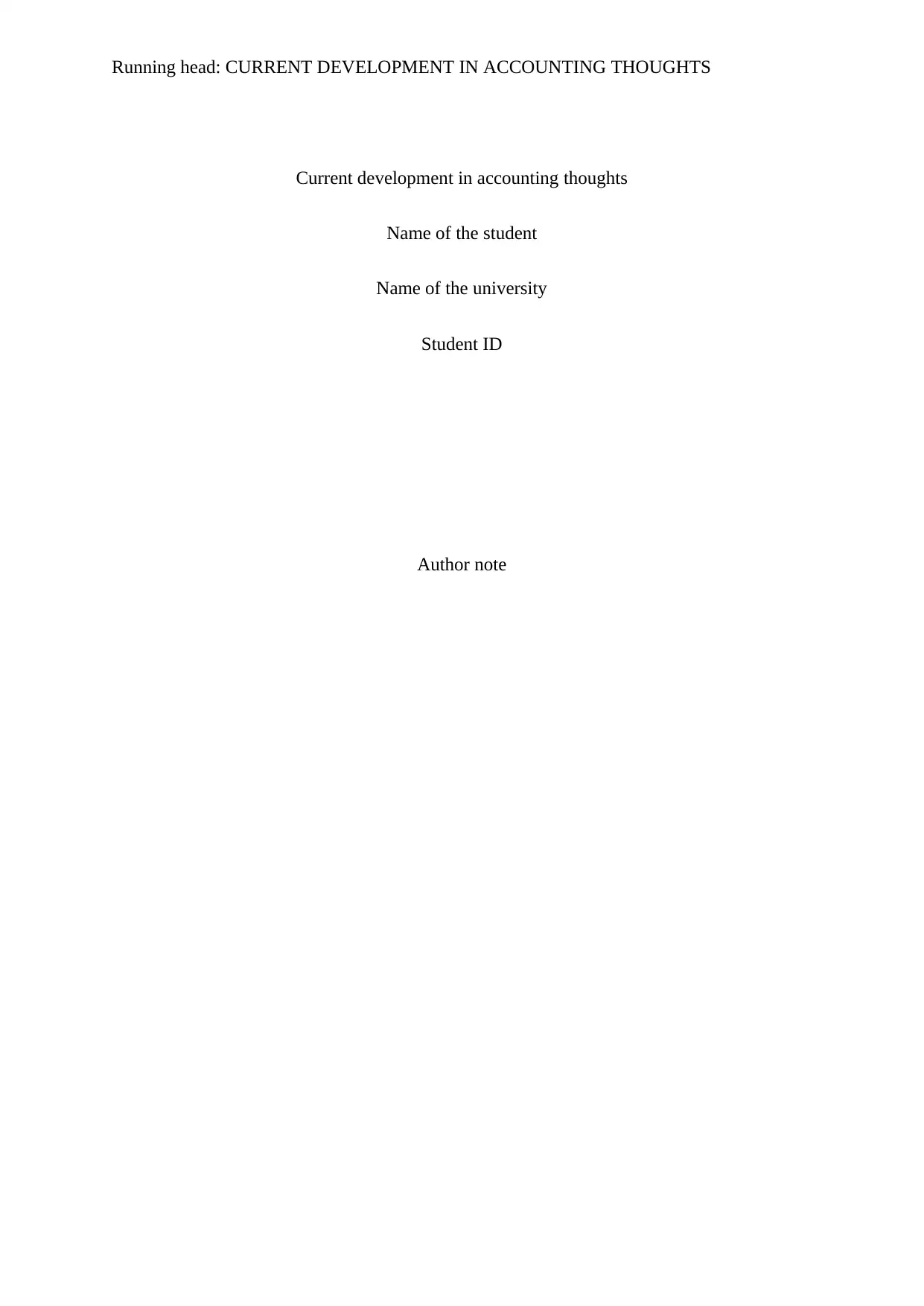
Running head: CURRENT DEVELOPMENT IN ACCOUNTING THOUGHTS
Current development in accounting thoughts
Name of the student
Name of the university
Student ID
Author note
Current development in accounting thoughts
Name of the student
Name of the university
Student ID
Author note
Paraphrase This Document
Need a fresh take? Get an instant paraphrase of this document with our AI Paraphraser
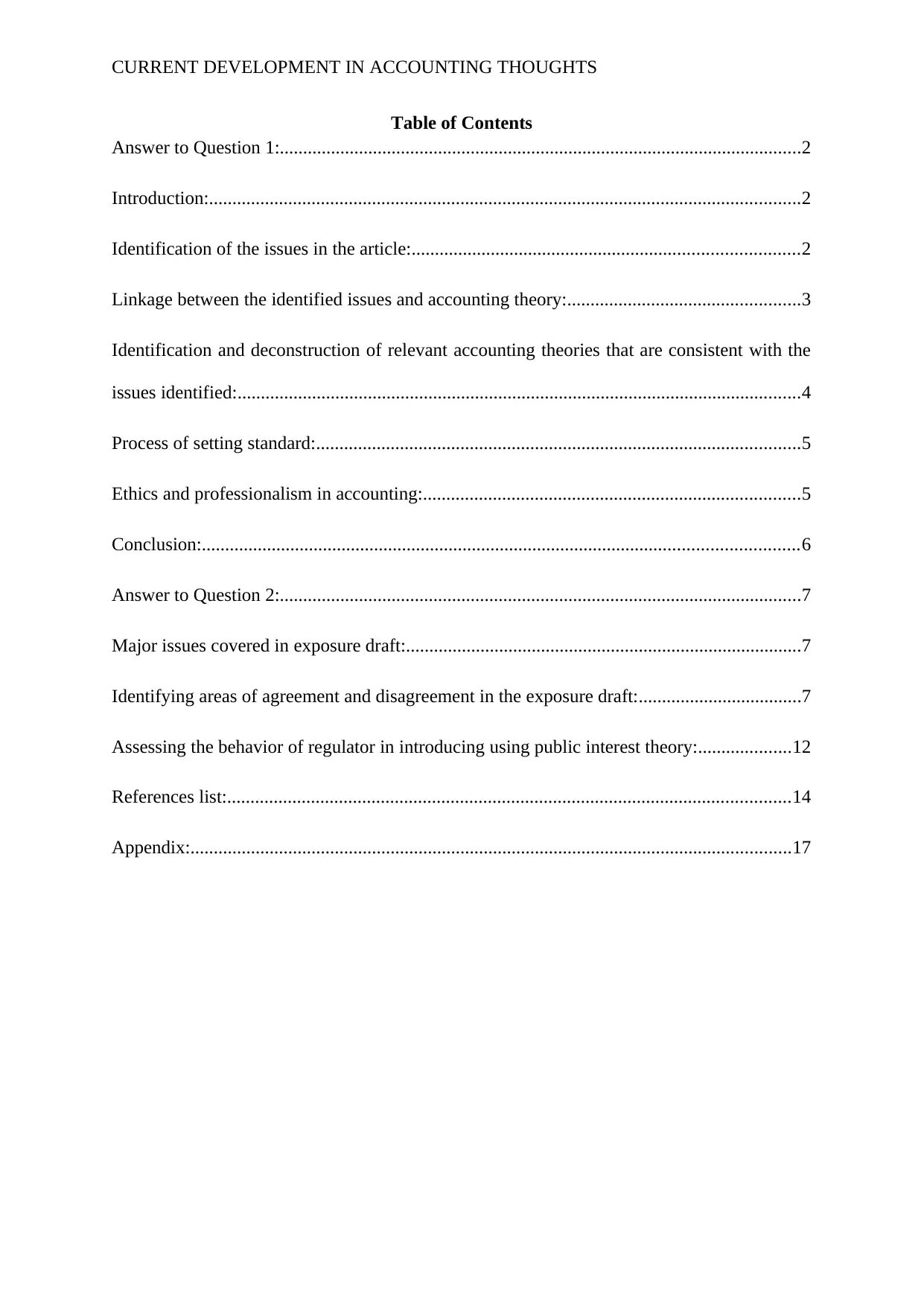
CURRENT DEVELOPMENT IN ACCOUNTING THOUGHTS
Table of Contents
Answer to Question 1:................................................................................................................2
Introduction:...............................................................................................................................2
Identification of the issues in the article:...................................................................................2
Linkage between the identified issues and accounting theory:..................................................3
Identification and deconstruction of relevant accounting theories that are consistent with the
issues identified:.........................................................................................................................4
Process of setting standard:........................................................................................................5
Ethics and professionalism in accounting:.................................................................................5
Conclusion:................................................................................................................................6
Answer to Question 2:................................................................................................................7
Major issues covered in exposure draft:.....................................................................................7
Identifying areas of agreement and disagreement in the exposure draft:...................................7
Assessing the behavior of regulator in introducing using public interest theory:....................12
References list:.........................................................................................................................14
Appendix:.................................................................................................................................17
Table of Contents
Answer to Question 1:................................................................................................................2
Introduction:...............................................................................................................................2
Identification of the issues in the article:...................................................................................2
Linkage between the identified issues and accounting theory:..................................................3
Identification and deconstruction of relevant accounting theories that are consistent with the
issues identified:.........................................................................................................................4
Process of setting standard:........................................................................................................5
Ethics and professionalism in accounting:.................................................................................5
Conclusion:................................................................................................................................6
Answer to Question 2:................................................................................................................7
Major issues covered in exposure draft:.....................................................................................7
Identifying areas of agreement and disagreement in the exposure draft:...................................7
Assessing the behavior of regulator in introducing using public interest theory:....................12
References list:.........................................................................................................................14
Appendix:.................................................................................................................................17
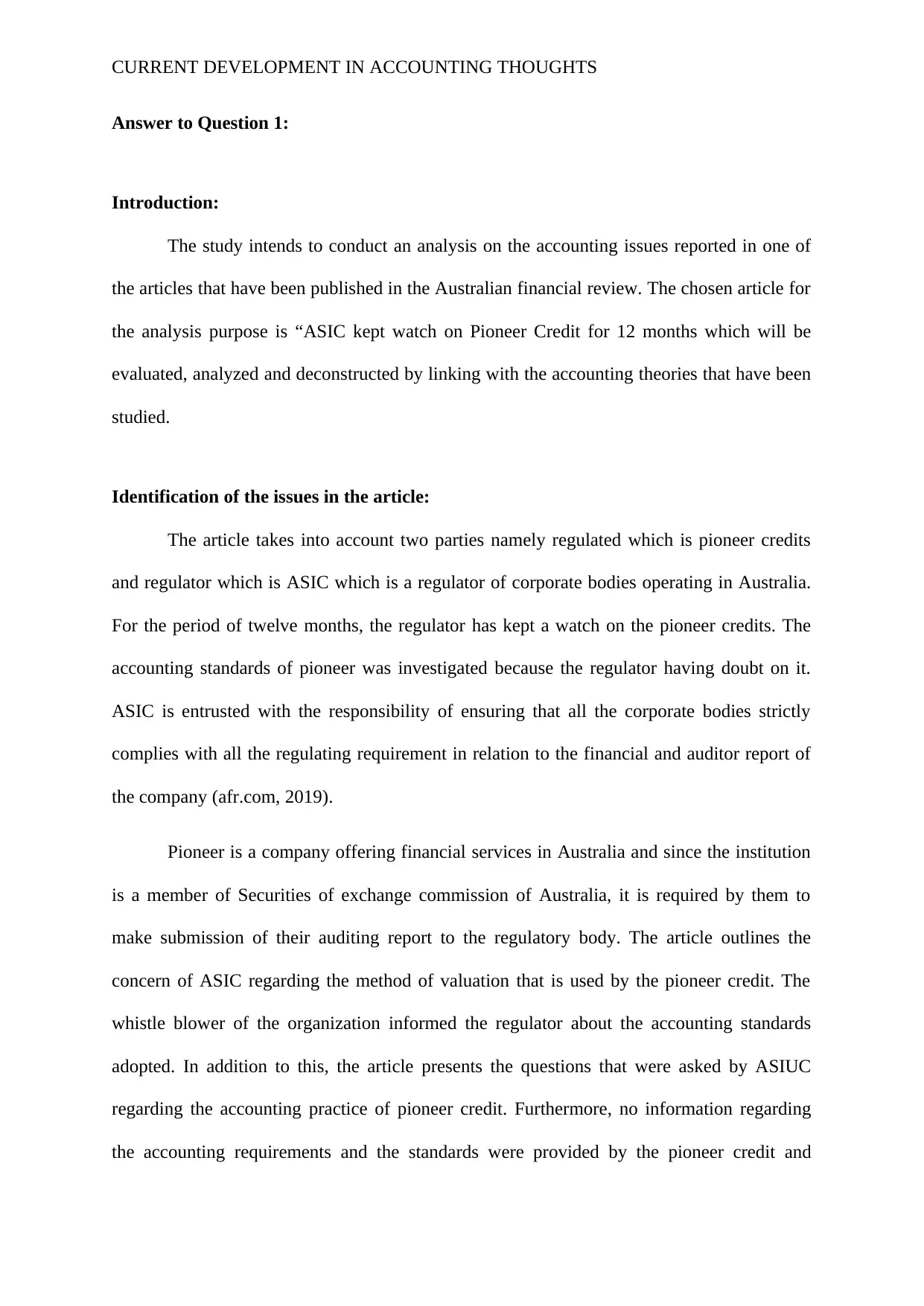
CURRENT DEVELOPMENT IN ACCOUNTING THOUGHTS
Answer to Question 1:
Introduction:
The study intends to conduct an analysis on the accounting issues reported in one of
the articles that have been published in the Australian financial review. The chosen article for
the analysis purpose is “ASIC kept watch on Pioneer Credit for 12 months which will be
evaluated, analyzed and deconstructed by linking with the accounting theories that have been
studied.
Identification of the issues in the article:
The article takes into account two parties namely regulated which is pioneer credits
and regulator which is ASIC which is a regulator of corporate bodies operating in Australia.
For the period of twelve months, the regulator has kept a watch on the pioneer credits. The
accounting standards of pioneer was investigated because the regulator having doubt on it.
ASIC is entrusted with the responsibility of ensuring that all the corporate bodies strictly
complies with all the regulating requirement in relation to the financial and auditor report of
the company (afr.com, 2019).
Pioneer is a company offering financial services in Australia and since the institution
is a member of Securities of exchange commission of Australia, it is required by them to
make submission of their auditing report to the regulatory body. The article outlines the
concern of ASIC regarding the method of valuation that is used by the pioneer credit. The
whistle blower of the organization informed the regulator about the accounting standards
adopted. In addition to this, the article presents the questions that were asked by ASIUC
regarding the accounting practice of pioneer credit. Furthermore, no information regarding
the accounting requirements and the standards were provided by the pioneer credit and
Answer to Question 1:
Introduction:
The study intends to conduct an analysis on the accounting issues reported in one of
the articles that have been published in the Australian financial review. The chosen article for
the analysis purpose is “ASIC kept watch on Pioneer Credit for 12 months which will be
evaluated, analyzed and deconstructed by linking with the accounting theories that have been
studied.
Identification of the issues in the article:
The article takes into account two parties namely regulated which is pioneer credits
and regulator which is ASIC which is a regulator of corporate bodies operating in Australia.
For the period of twelve months, the regulator has kept a watch on the pioneer credits. The
accounting standards of pioneer was investigated because the regulator having doubt on it.
ASIC is entrusted with the responsibility of ensuring that all the corporate bodies strictly
complies with all the regulating requirement in relation to the financial and auditor report of
the company (afr.com, 2019).
Pioneer is a company offering financial services in Australia and since the institution
is a member of Securities of exchange commission of Australia, it is required by them to
make submission of their auditing report to the regulatory body. The article outlines the
concern of ASIC regarding the method of valuation that is used by the pioneer credit. The
whistle blower of the organization informed the regulator about the accounting standards
adopted. In addition to this, the article presents the questions that were asked by ASIUC
regarding the accounting practice of pioneer credit. Furthermore, no information regarding
the accounting requirements and the standards were provided by the pioneer credit and
⊘ This is a preview!⊘
Do you want full access?
Subscribe today to unlock all pages.

Trusted by 1+ million students worldwide
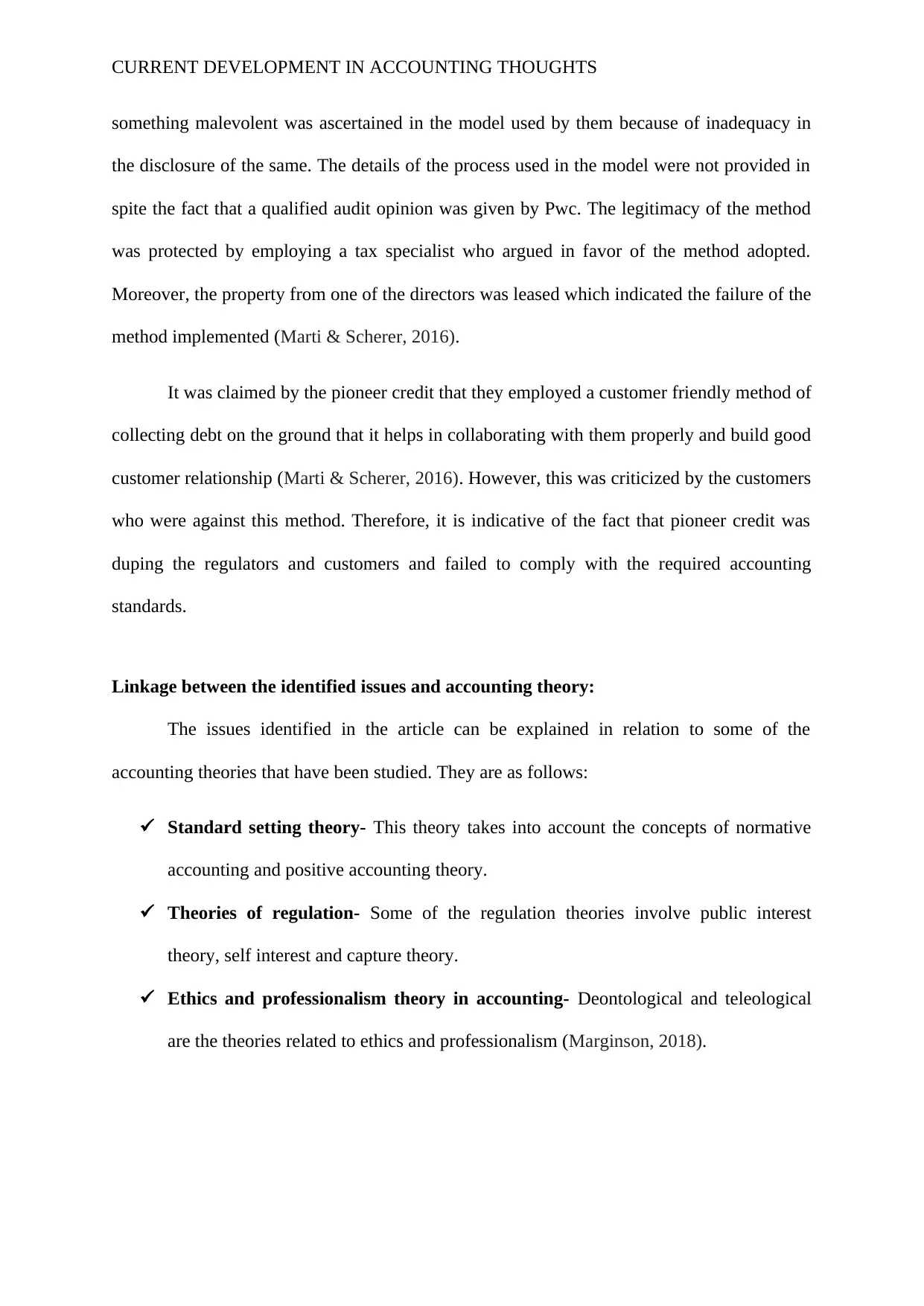
CURRENT DEVELOPMENT IN ACCOUNTING THOUGHTS
something malevolent was ascertained in the model used by them because of inadequacy in
the disclosure of the same. The details of the process used in the model were not provided in
spite the fact that a qualified audit opinion was given by Pwc. The legitimacy of the method
was protected by employing a tax specialist who argued in favor of the method adopted.
Moreover, the property from one of the directors was leased which indicated the failure of the
method implemented (Marti & Scherer, 2016).
It was claimed by the pioneer credit that they employed a customer friendly method of
collecting debt on the ground that it helps in collaborating with them properly and build good
customer relationship (Marti & Scherer, 2016). However, this was criticized by the customers
who were against this method. Therefore, it is indicative of the fact that pioneer credit was
duping the regulators and customers and failed to comply with the required accounting
standards.
Linkage between the identified issues and accounting theory:
The issues identified in the article can be explained in relation to some of the
accounting theories that have been studied. They are as follows:
Standard setting theory- This theory takes into account the concepts of normative
accounting and positive accounting theory.
Theories of regulation- Some of the regulation theories involve public interest
theory, self interest and capture theory.
Ethics and professionalism theory in accounting- Deontological and teleological
are the theories related to ethics and professionalism (Marginson, 2018).
something malevolent was ascertained in the model used by them because of inadequacy in
the disclosure of the same. The details of the process used in the model were not provided in
spite the fact that a qualified audit opinion was given by Pwc. The legitimacy of the method
was protected by employing a tax specialist who argued in favor of the method adopted.
Moreover, the property from one of the directors was leased which indicated the failure of the
method implemented (Marti & Scherer, 2016).
It was claimed by the pioneer credit that they employed a customer friendly method of
collecting debt on the ground that it helps in collaborating with them properly and build good
customer relationship (Marti & Scherer, 2016). However, this was criticized by the customers
who were against this method. Therefore, it is indicative of the fact that pioneer credit was
duping the regulators and customers and failed to comply with the required accounting
standards.
Linkage between the identified issues and accounting theory:
The issues identified in the article can be explained in relation to some of the
accounting theories that have been studied. They are as follows:
Standard setting theory- This theory takes into account the concepts of normative
accounting and positive accounting theory.
Theories of regulation- Some of the regulation theories involve public interest
theory, self interest and capture theory.
Ethics and professionalism theory in accounting- Deontological and teleological
are the theories related to ethics and professionalism (Marginson, 2018).
Paraphrase This Document
Need a fresh take? Get an instant paraphrase of this document with our AI Paraphraser
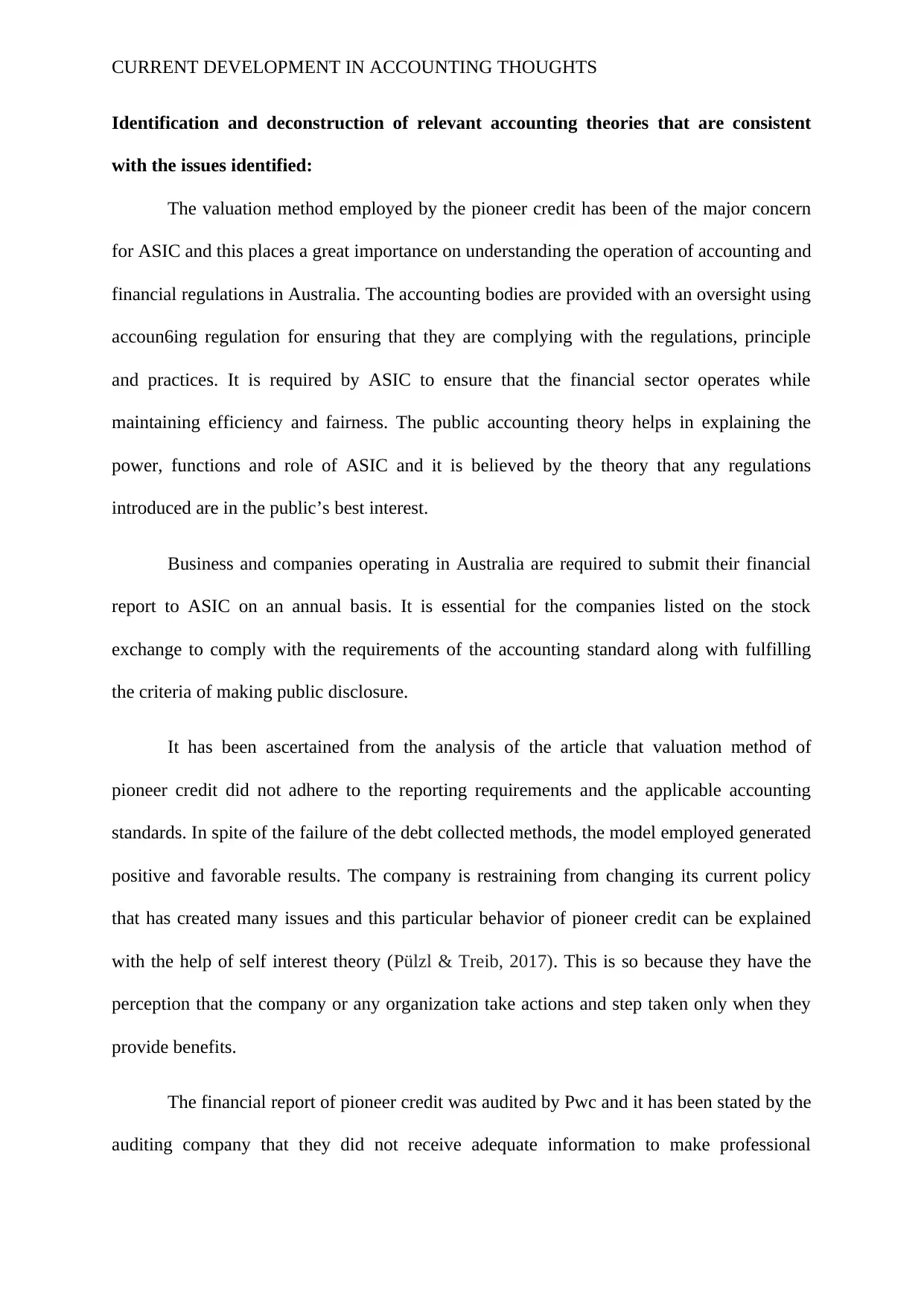
CURRENT DEVELOPMENT IN ACCOUNTING THOUGHTS
Identification and deconstruction of relevant accounting theories that are consistent
with the issues identified:
The valuation method employed by the pioneer credit has been of the major concern
for ASIC and this places a great importance on understanding the operation of accounting and
financial regulations in Australia. The accounting bodies are provided with an oversight using
accoun6ing regulation for ensuring that they are complying with the regulations, principle
and practices. It is required by ASIC to ensure that the financial sector operates while
maintaining efficiency and fairness. The public accounting theory helps in explaining the
power, functions and role of ASIC and it is believed by the theory that any regulations
introduced are in the public’s best interest.
Business and companies operating in Australia are required to submit their financial
report to ASIC on an annual basis. It is essential for the companies listed on the stock
exchange to comply with the requirements of the accounting standard along with fulfilling
the criteria of making public disclosure.
It has been ascertained from the analysis of the article that valuation method of
pioneer credit did not adhere to the reporting requirements and the applicable accounting
standards. In spite of the failure of the debt collected methods, the model employed generated
positive and favorable results. The company is restraining from changing its current policy
that has created many issues and this particular behavior of pioneer credit can be explained
with the help of self interest theory (Pülzl & Treib, 2017). This is so because they have the
perception that the company or any organization take actions and step taken only when they
provide benefits.
The financial report of pioneer credit was audited by Pwc and it has been stated by the
auditing company that they did not receive adequate information to make professional
Identification and deconstruction of relevant accounting theories that are consistent
with the issues identified:
The valuation method employed by the pioneer credit has been of the major concern
for ASIC and this places a great importance on understanding the operation of accounting and
financial regulations in Australia. The accounting bodies are provided with an oversight using
accoun6ing regulation for ensuring that they are complying with the regulations, principle
and practices. It is required by ASIC to ensure that the financial sector operates while
maintaining efficiency and fairness. The public accounting theory helps in explaining the
power, functions and role of ASIC and it is believed by the theory that any regulations
introduced are in the public’s best interest.
Business and companies operating in Australia are required to submit their financial
report to ASIC on an annual basis. It is essential for the companies listed on the stock
exchange to comply with the requirements of the accounting standard along with fulfilling
the criteria of making public disclosure.
It has been ascertained from the analysis of the article that valuation method of
pioneer credit did not adhere to the reporting requirements and the applicable accounting
standards. In spite of the failure of the debt collected methods, the model employed generated
positive and favorable results. The company is restraining from changing its current policy
that has created many issues and this particular behavior of pioneer credit can be explained
with the help of self interest theory (Pülzl & Treib, 2017). This is so because they have the
perception that the company or any organization take actions and step taken only when they
provide benefits.
The financial report of pioneer credit was audited by Pwc and it has been stated by the
auditing company that they did not receive adequate information to make professional
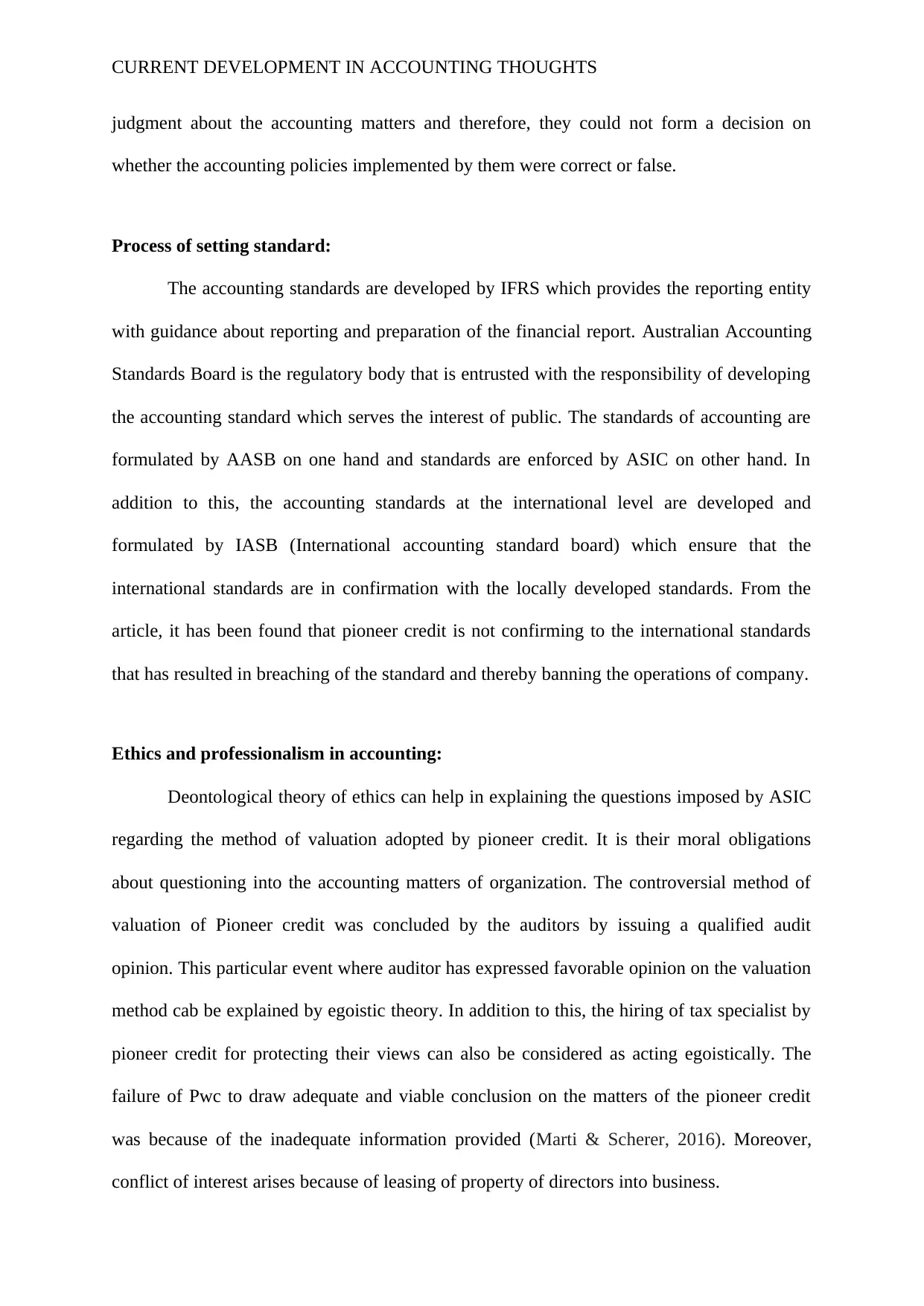
CURRENT DEVELOPMENT IN ACCOUNTING THOUGHTS
judgment about the accounting matters and therefore, they could not form a decision on
whether the accounting policies implemented by them were correct or false.
Process of setting standard:
The accounting standards are developed by IFRS which provides the reporting entity
with guidance about reporting and preparation of the financial report. Australian Accounting
Standards Board is the regulatory body that is entrusted with the responsibility of developing
the accounting standard which serves the interest of public. The standards of accounting are
formulated by AASB on one hand and standards are enforced by ASIC on other hand. In
addition to this, the accounting standards at the international level are developed and
formulated by IASB (International accounting standard board) which ensure that the
international standards are in confirmation with the locally developed standards. From the
article, it has been found that pioneer credit is not confirming to the international standards
that has resulted in breaching of the standard and thereby banning the operations of company.
Ethics and professionalism in accounting:
Deontological theory of ethics can help in explaining the questions imposed by ASIC
regarding the method of valuation adopted by pioneer credit. It is their moral obligations
about questioning into the accounting matters of organization. The controversial method of
valuation of Pioneer credit was concluded by the auditors by issuing a qualified audit
opinion. This particular event where auditor has expressed favorable opinion on the valuation
method cab be explained by egoistic theory. In addition to this, the hiring of tax specialist by
pioneer credit for protecting their views can also be considered as acting egoistically. The
failure of Pwc to draw adequate and viable conclusion on the matters of the pioneer credit
was because of the inadequate information provided (Marti & Scherer, 2016). Moreover,
conflict of interest arises because of leasing of property of directors into business.
judgment about the accounting matters and therefore, they could not form a decision on
whether the accounting policies implemented by them were correct or false.
Process of setting standard:
The accounting standards are developed by IFRS which provides the reporting entity
with guidance about reporting and preparation of the financial report. Australian Accounting
Standards Board is the regulatory body that is entrusted with the responsibility of developing
the accounting standard which serves the interest of public. The standards of accounting are
formulated by AASB on one hand and standards are enforced by ASIC on other hand. In
addition to this, the accounting standards at the international level are developed and
formulated by IASB (International accounting standard board) which ensure that the
international standards are in confirmation with the locally developed standards. From the
article, it has been found that pioneer credit is not confirming to the international standards
that has resulted in breaching of the standard and thereby banning the operations of company.
Ethics and professionalism in accounting:
Deontological theory of ethics can help in explaining the questions imposed by ASIC
regarding the method of valuation adopted by pioneer credit. It is their moral obligations
about questioning into the accounting matters of organization. The controversial method of
valuation of Pioneer credit was concluded by the auditors by issuing a qualified audit
opinion. This particular event where auditor has expressed favorable opinion on the valuation
method cab be explained by egoistic theory. In addition to this, the hiring of tax specialist by
pioneer credit for protecting their views can also be considered as acting egoistically. The
failure of Pwc to draw adequate and viable conclusion on the matters of the pioneer credit
was because of the inadequate information provided (Marti & Scherer, 2016). Moreover,
conflict of interest arises because of leasing of property of directors into business.
⊘ This is a preview!⊘
Do you want full access?
Subscribe today to unlock all pages.

Trusted by 1+ million students worldwide
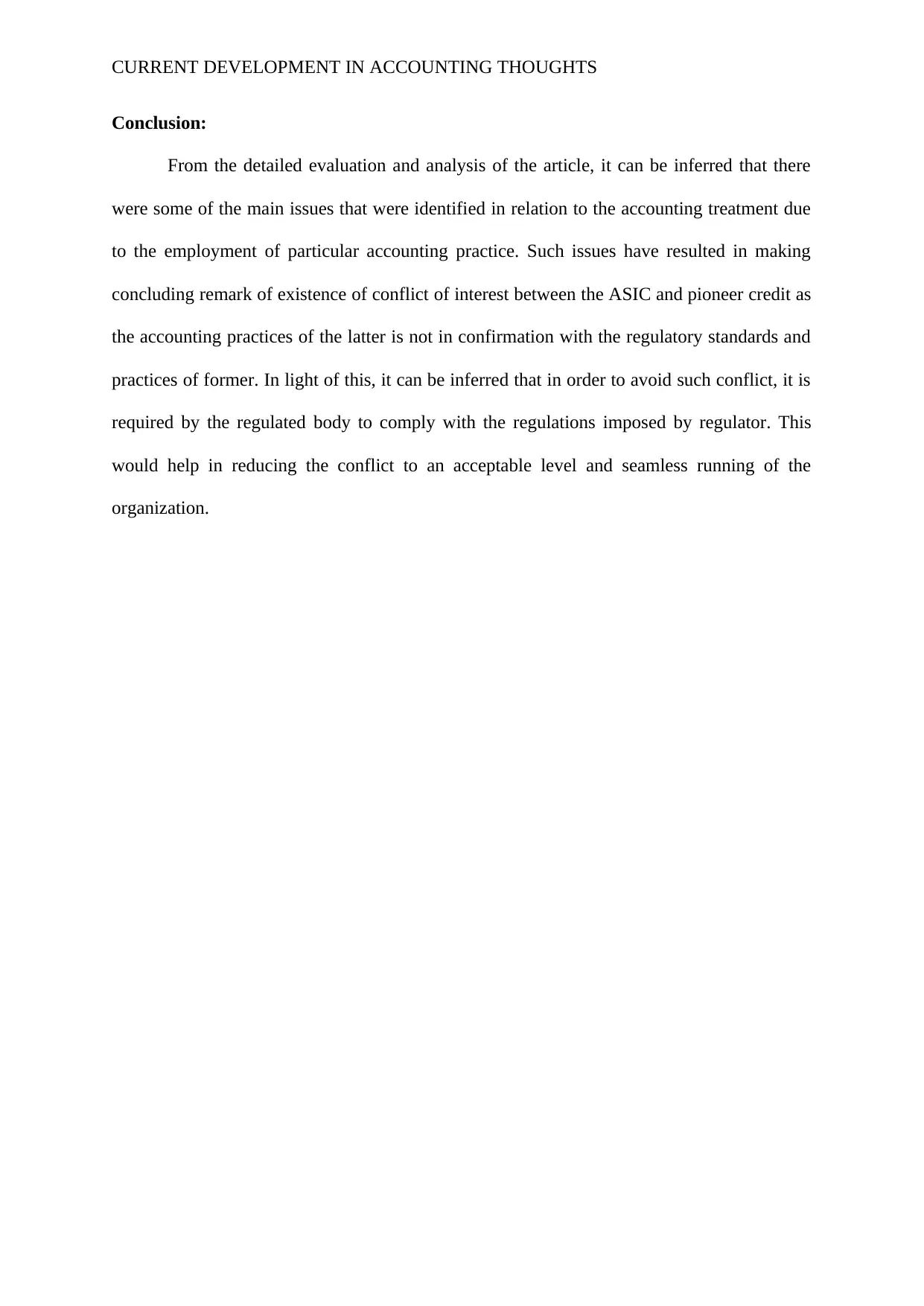
CURRENT DEVELOPMENT IN ACCOUNTING THOUGHTS
Conclusion:
From the detailed evaluation and analysis of the article, it can be inferred that there
were some of the main issues that were identified in relation to the accounting treatment due
to the employment of particular accounting practice. Such issues have resulted in making
concluding remark of existence of conflict of interest between the ASIC and pioneer credit as
the accounting practices of the latter is not in confirmation with the regulatory standards and
practices of former. In light of this, it can be inferred that in order to avoid such conflict, it is
required by the regulated body to comply with the regulations imposed by regulator. This
would help in reducing the conflict to an acceptable level and seamless running of the
organization.
Conclusion:
From the detailed evaluation and analysis of the article, it can be inferred that there
were some of the main issues that were identified in relation to the accounting treatment due
to the employment of particular accounting practice. Such issues have resulted in making
concluding remark of existence of conflict of interest between the ASIC and pioneer credit as
the accounting practices of the latter is not in confirmation with the regulatory standards and
practices of former. In light of this, it can be inferred that in order to avoid such conflict, it is
required by the regulated body to comply with the regulations imposed by regulator. This
would help in reducing the conflict to an acceptable level and seamless running of the
organization.
Paraphrase This Document
Need a fresh take? Get an instant paraphrase of this document with our AI Paraphraser
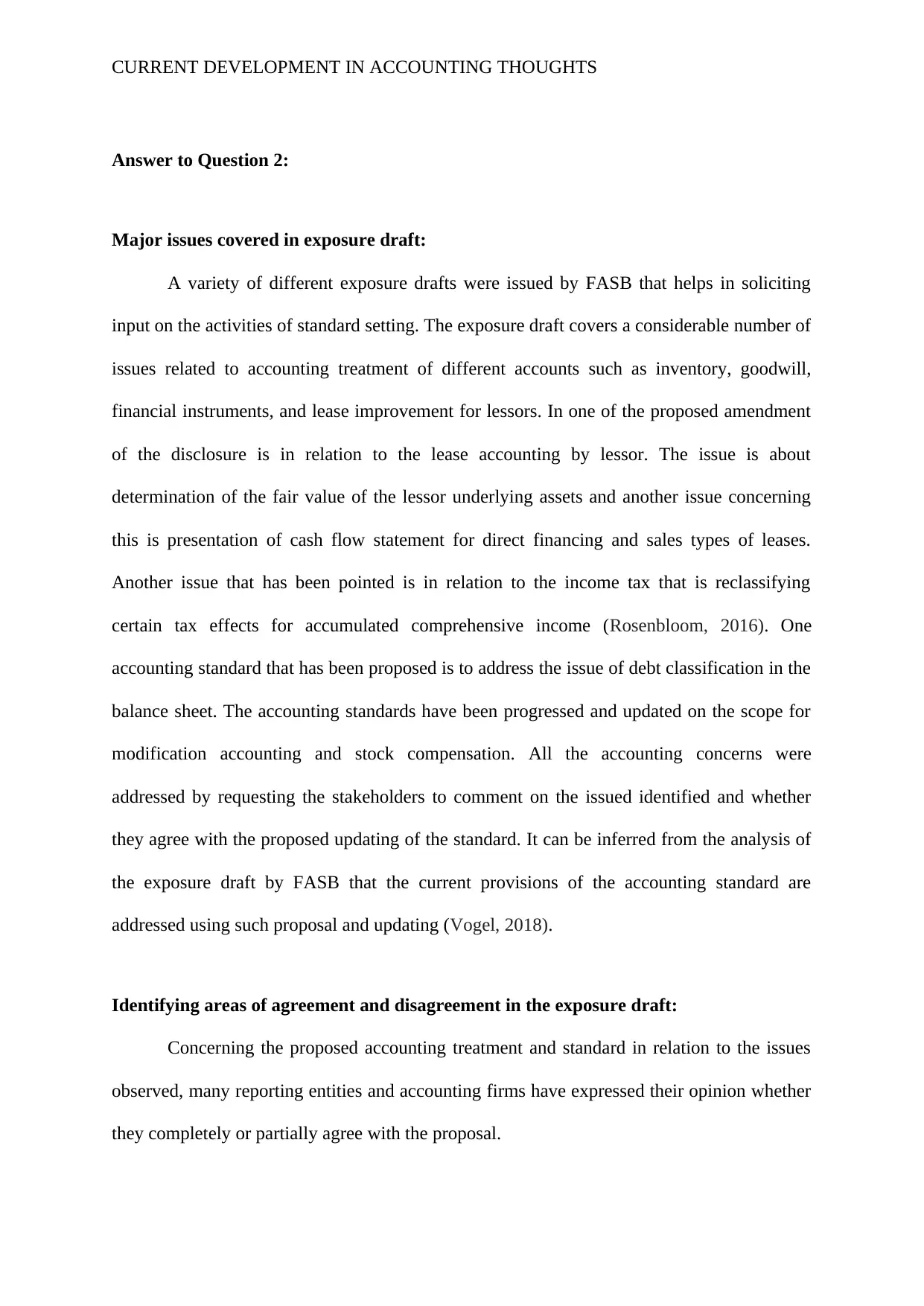
CURRENT DEVELOPMENT IN ACCOUNTING THOUGHTS
Answer to Question 2:
Major issues covered in exposure draft:
A variety of different exposure drafts were issued by FASB that helps in soliciting
input on the activities of standard setting. The exposure draft covers a considerable number of
issues related to accounting treatment of different accounts such as inventory, goodwill,
financial instruments, and lease improvement for lessors. In one of the proposed amendment
of the disclosure is in relation to the lease accounting by lessor. The issue is about
determination of the fair value of the lessor underlying assets and another issue concerning
this is presentation of cash flow statement for direct financing and sales types of leases.
Another issue that has been pointed is in relation to the income tax that is reclassifying
certain tax effects for accumulated comprehensive income (Rosenbloom, 2016). One
accounting standard that has been proposed is to address the issue of debt classification in the
balance sheet. The accounting standards have been progressed and updated on the scope for
modification accounting and stock compensation. All the accounting concerns were
addressed by requesting the stakeholders to comment on the issued identified and whether
they agree with the proposed updating of the standard. It can be inferred from the analysis of
the exposure draft by FASB that the current provisions of the accounting standard are
addressed using such proposal and updating (Vogel, 2018).
Identifying areas of agreement and disagreement in the exposure draft:
Concerning the proposed accounting treatment and standard in relation to the issues
observed, many reporting entities and accounting firms have expressed their opinion whether
they completely or partially agree with the proposal.
Answer to Question 2:
Major issues covered in exposure draft:
A variety of different exposure drafts were issued by FASB that helps in soliciting
input on the activities of standard setting. The exposure draft covers a considerable number of
issues related to accounting treatment of different accounts such as inventory, goodwill,
financial instruments, and lease improvement for lessors. In one of the proposed amendment
of the disclosure is in relation to the lease accounting by lessor. The issue is about
determination of the fair value of the lessor underlying assets and another issue concerning
this is presentation of cash flow statement for direct financing and sales types of leases.
Another issue that has been pointed is in relation to the income tax that is reclassifying
certain tax effects for accumulated comprehensive income (Rosenbloom, 2016). One
accounting standard that has been proposed is to address the issue of debt classification in the
balance sheet. The accounting standards have been progressed and updated on the scope for
modification accounting and stock compensation. All the accounting concerns were
addressed by requesting the stakeholders to comment on the issued identified and whether
they agree with the proposed updating of the standard. It can be inferred from the analysis of
the exposure draft by FASB that the current provisions of the accounting standard are
addressed using such proposal and updating (Vogel, 2018).
Identifying areas of agreement and disagreement in the exposure draft:
Concerning the proposed accounting treatment and standard in relation to the issues
observed, many reporting entities and accounting firms have expressed their opinion whether
they completely or partially agree with the proposal.
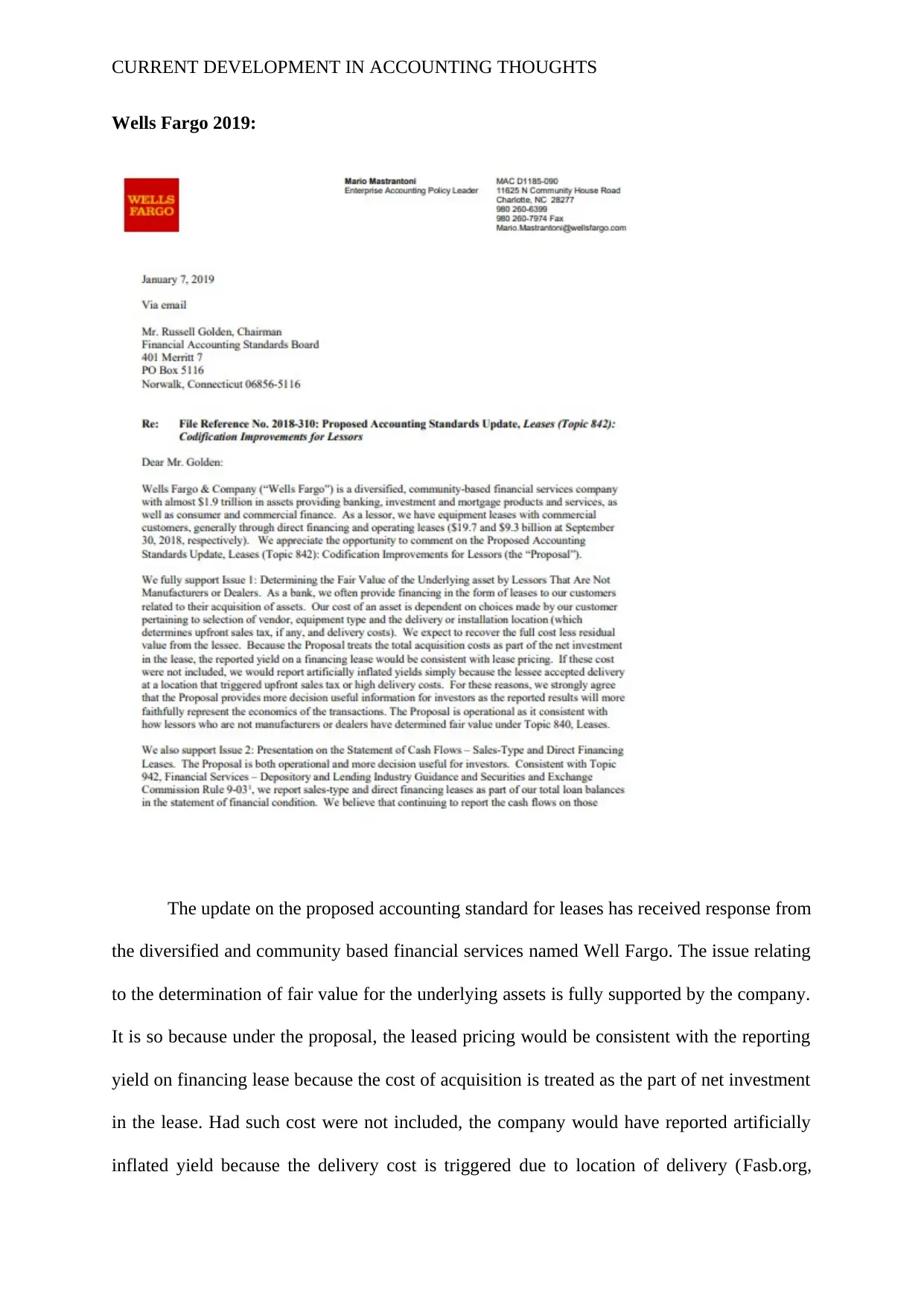
CURRENT DEVELOPMENT IN ACCOUNTING THOUGHTS
Wells Fargo 2019:
The update on the proposed accounting standard for leases has received response from
the diversified and community based financial services named Well Fargo. The issue relating
to the determination of fair value for the underlying assets is fully supported by the company.
It is so because under the proposal, the leased pricing would be consistent with the reporting
yield on financing lease because the cost of acquisition is treated as the part of net investment
in the lease. Had such cost were not included, the company would have reported artificially
inflated yield because the delivery cost is triggered due to location of delivery (Fasb.org,
Wells Fargo 2019:
The update on the proposed accounting standard for leases has received response from
the diversified and community based financial services named Well Fargo. The issue relating
to the determination of fair value for the underlying assets is fully supported by the company.
It is so because under the proposal, the leased pricing would be consistent with the reporting
yield on financing lease because the cost of acquisition is treated as the part of net investment
in the lease. Had such cost were not included, the company would have reported artificially
inflated yield because the delivery cost is triggered due to location of delivery (Fasb.org,
⊘ This is a preview!⊘
Do you want full access?
Subscribe today to unlock all pages.

Trusted by 1+ million students worldwide
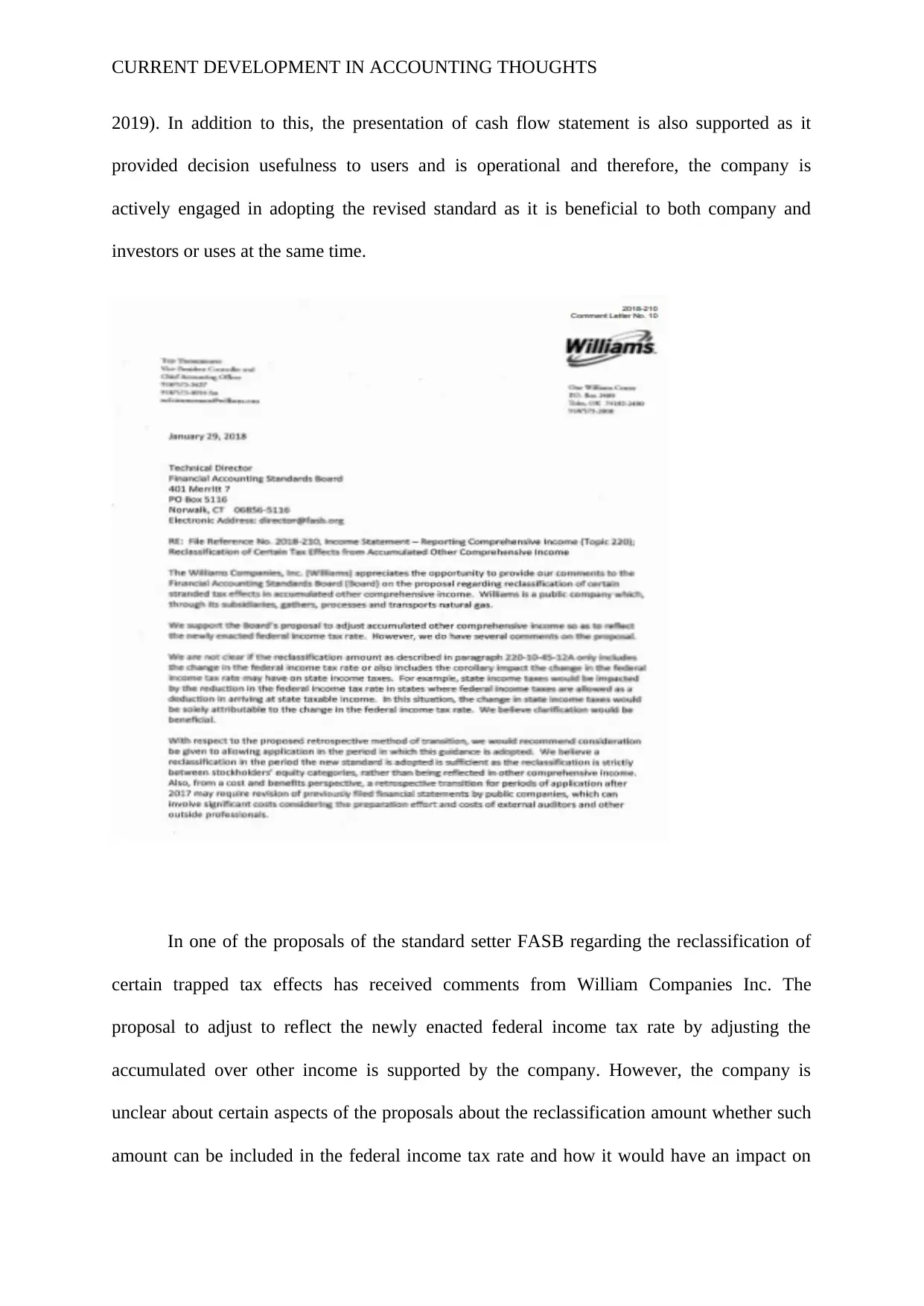
CURRENT DEVELOPMENT IN ACCOUNTING THOUGHTS
2019). In addition to this, the presentation of cash flow statement is also supported as it
provided decision usefulness to users and is operational and therefore, the company is
actively engaged in adopting the revised standard as it is beneficial to both company and
investors or uses at the same time.
In one of the proposals of the standard setter FASB regarding the reclassification of
certain trapped tax effects has received comments from William Companies Inc. The
proposal to adjust to reflect the newly enacted federal income tax rate by adjusting the
accumulated over other income is supported by the company. However, the company is
unclear about certain aspects of the proposals about the reclassification amount whether such
amount can be included in the federal income tax rate and how it would have an impact on
2019). In addition to this, the presentation of cash flow statement is also supported as it
provided decision usefulness to users and is operational and therefore, the company is
actively engaged in adopting the revised standard as it is beneficial to both company and
investors or uses at the same time.
In one of the proposals of the standard setter FASB regarding the reclassification of
certain trapped tax effects has received comments from William Companies Inc. The
proposal to adjust to reflect the newly enacted federal income tax rate by adjusting the
accumulated over other income is supported by the company. However, the company is
unclear about certain aspects of the proposals about the reclassification amount whether such
amount can be included in the federal income tax rate and how it would have an impact on
Paraphrase This Document
Need a fresh take? Get an instant paraphrase of this document with our AI Paraphraser
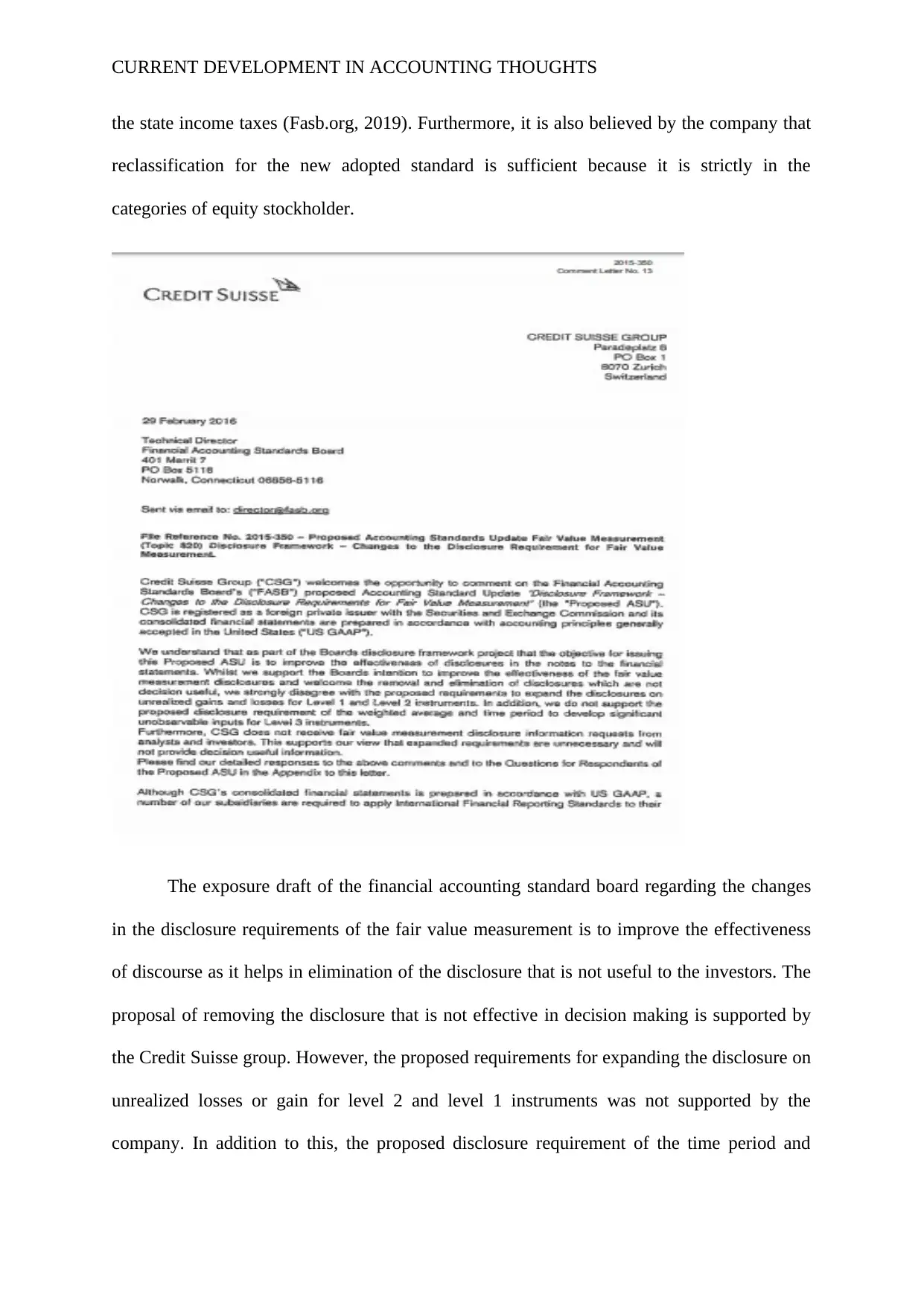
CURRENT DEVELOPMENT IN ACCOUNTING THOUGHTS
the state income taxes (Fasb.org, 2019). Furthermore, it is also believed by the company that
reclassification for the new adopted standard is sufficient because it is strictly in the
categories of equity stockholder.
The exposure draft of the financial accounting standard board regarding the changes
in the disclosure requirements of the fair value measurement is to improve the effectiveness
of discourse as it helps in elimination of the disclosure that is not useful to the investors. The
proposal of removing the disclosure that is not effective in decision making is supported by
the Credit Suisse group. However, the proposed requirements for expanding the disclosure on
unrealized losses or gain for level 2 and level 1 instruments was not supported by the
company. In addition to this, the proposed disclosure requirement of the time period and
the state income taxes (Fasb.org, 2019). Furthermore, it is also believed by the company that
reclassification for the new adopted standard is sufficient because it is strictly in the
categories of equity stockholder.
The exposure draft of the financial accounting standard board regarding the changes
in the disclosure requirements of the fair value measurement is to improve the effectiveness
of discourse as it helps in elimination of the disclosure that is not useful to the investors. The
proposal of removing the disclosure that is not effective in decision making is supported by
the Credit Suisse group. However, the proposed requirements for expanding the disclosure on
unrealized losses or gain for level 2 and level 1 instruments was not supported by the
company. In addition to this, the proposed disclosure requirement of the time period and
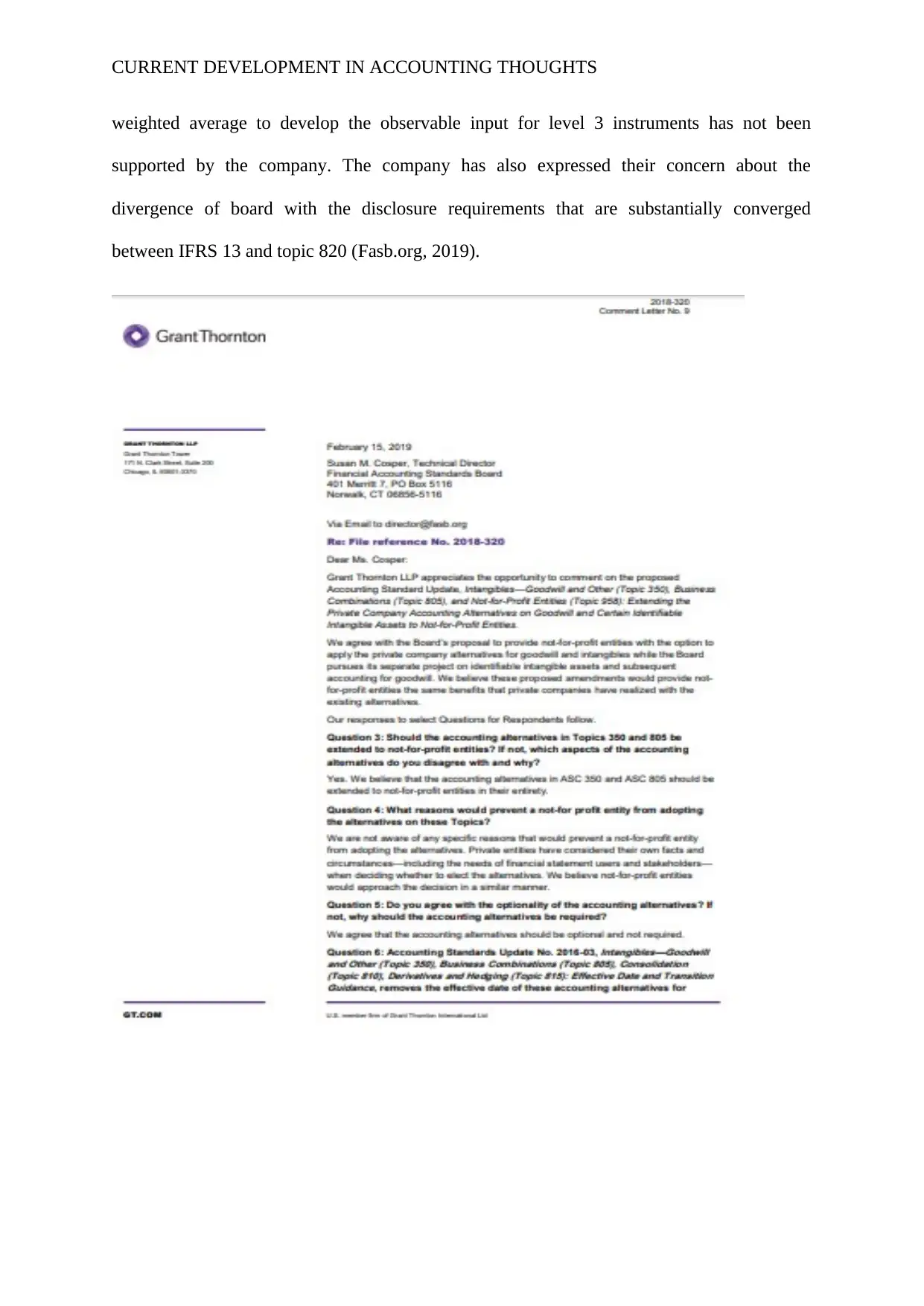
CURRENT DEVELOPMENT IN ACCOUNTING THOUGHTS
weighted average to develop the observable input for level 3 instruments has not been
supported by the company. The company has also expressed their concern about the
divergence of board with the disclosure requirements that are substantially converged
between IFRS 13 and topic 820 (Fasb.org, 2019).
weighted average to develop the observable input for level 3 instruments has not been
supported by the company. The company has also expressed their concern about the
divergence of board with the disclosure requirements that are substantially converged
between IFRS 13 and topic 820 (Fasb.org, 2019).
⊘ This is a preview!⊘
Do you want full access?
Subscribe today to unlock all pages.

Trusted by 1+ million students worldwide
1 out of 19
Related Documents
Your All-in-One AI-Powered Toolkit for Academic Success.
+13062052269
info@desklib.com
Available 24*7 on WhatsApp / Email
![[object Object]](/_next/static/media/star-bottom.7253800d.svg)
Unlock your academic potential
Copyright © 2020–2026 A2Z Services. All Rights Reserved. Developed and managed by ZUCOL.




